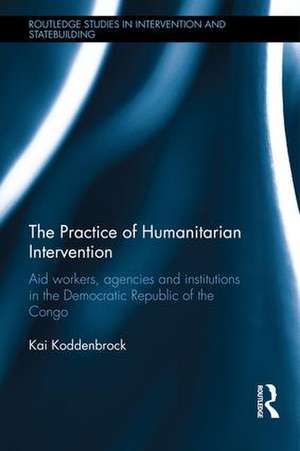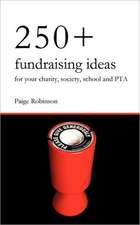The Practice of Humanitarian Intervention: Aid workers, Agencies and Institutions in the Democratic Republic of the Congo: Routledge Studies in Intervention and Statebuilding
Autor Kai Koddenbrocken Limba Engleză Hardback – 4 sep 2015
Using the Democratic Republic of the Congo as a case study – an object of Western intervention since colonial times – this book scrutinizes the contemporary practice of humanitarian intervention from the inside. It seeks to expose how humanitarian aid and peacekeeping works, what obstacles they encounter and how they manage to retain their legitimacy. By examining the relationship between the West and the DR Congo, this volume asks why intervention continues to be so central for the relationship between Western and local spheres. Why is it normal and self-evident? The main answer developed here is that the separation of these two spheres allows intervention to enjoy sufficient degrees of legitimacy to be sustained. Owing to the contradictions that surface when juxtaposing the Western and Congolese spheres, this book highlights how keeping them separate is key to sustaining intervention. Bridging the divide between the liberal peace debate in International Relations and anthropologies of humanitarianism, this volume thus presents an important contribution to taking both the legitimizing proclamations and ‘local’ realities of intervention seriously.
The book will be of much interest to students of statebuilding, peacebuilding, peacekeeping, anthropology, research methods and IR in general.
| Toate formatele și edițiile | Preț | Express |
|---|---|---|
| Paperback (1) | 303.50 lei 6-8 săpt. | |
| Taylor & Francis – 13 dec 2017 | 303.50 lei 6-8 săpt. | |
| Hardback (1) | 711.73 lei 6-8 săpt. | |
| Taylor & Francis – 4 sep 2015 | 711.73 lei 6-8 săpt. |
Din seria Routledge Studies in Intervention and Statebuilding
-
 Preț: 286.65 lei
Preț: 286.65 lei -
 Preț: 311.41 lei
Preț: 311.41 lei - 9%
 Preț: 867.38 lei
Preț: 867.38 lei -
 Preț: 93.90 lei
Preț: 93.90 lei -
 Preț: 473.76 lei
Preț: 473.76 lei - 18%
 Preț: 983.09 lei
Preț: 983.09 lei - 17%
 Preț: 270.59 lei
Preț: 270.59 lei - 17%
 Preț: 268.98 lei
Preț: 268.98 lei -
 Preț: 403.15 lei
Preț: 403.15 lei -
 Preț: 381.83 lei
Preț: 381.83 lei -
 Preț: 381.57 lei
Preț: 381.57 lei -
 Preț: 482.64 lei
Preț: 482.64 lei -
 Preț: 427.37 lei
Preț: 427.37 lei - 26%
 Preț: 850.68 lei
Preț: 850.68 lei -
 Preț: 381.83 lei
Preț: 381.83 lei - 18%
 Preț: 1139.26 lei
Preț: 1139.26 lei - 26%
 Preț: 818.77 lei
Preț: 818.77 lei -
 Preț: 381.57 lei
Preț: 381.57 lei -
 Preț: 381.83 lei
Preț: 381.83 lei - 12%
 Preț: 339.84 lei
Preț: 339.84 lei - 26%
 Preț: 764.65 lei
Preț: 764.65 lei - 26%
 Preț: 761.80 lei
Preț: 761.80 lei - 12%
 Preț: 299.05 lei
Preț: 299.05 lei - 18%
 Preț: 1095.45 lei
Preț: 1095.45 lei -
 Preț: 407.85 lei
Preț: 407.85 lei - 18%
 Preț: 1031.81 lei
Preț: 1031.81 lei - 12%
 Preț: 299.05 lei
Preț: 299.05 lei - 26%
 Preț: 851.21 lei
Preț: 851.21 lei -
 Preț: 206.41 lei
Preț: 206.41 lei - 18%
 Preț: 685.81 lei
Preț: 685.81 lei - 26%
 Preț: 761.39 lei
Preț: 761.39 lei -
 Preț: 452.38 lei
Preț: 452.38 lei - 18%
 Preț: 1143.67 lei
Preț: 1143.67 lei - 18%
 Preț: 1039.03 lei
Preț: 1039.03 lei -
 Preț: 401.49 lei
Preț: 401.49 lei
Preț: 711.73 lei
Preț vechi: 867.97 lei
-18% Nou
Puncte Express: 1068
Preț estimativ în valută:
136.25€ • 141.84$ • 112.17£
136.25€ • 141.84$ • 112.17£
Carte tipărită la comandă
Livrare economică 31 ianuarie-14 februarie 25
Preluare comenzi: 021 569.72.76
Specificații
ISBN-13: 9781138890183
ISBN-10: 1138890189
Pagini: 178
Ilustrații: 1 black & white tables, 2 black & white halftones, 2 black & white line drawings
Dimensiuni: 156 x 234 x 15 mm
Greutate: 0.41 kg
Ediția:1
Editura: Taylor & Francis
Colecția Routledge
Seria Routledge Studies in Intervention and Statebuilding
Locul publicării:Oxford, United Kingdom
ISBN-10: 1138890189
Pagini: 178
Ilustrații: 1 black & white tables, 2 black & white halftones, 2 black & white line drawings
Dimensiuni: 156 x 234 x 15 mm
Greutate: 0.41 kg
Ediția:1
Editura: Taylor & Francis
Colecția Routledge
Seria Routledge Studies in Intervention and Statebuilding
Locul publicării:Oxford, United Kingdom
Public țintă
Postgraduate, Professional, and UndergraduateCuprins
Introduction 1. Ruling the Congo: Colonial Legacies and Strategies of Rule Today 2. A Congo Ripe for Intervention: The Pitfalls of Knowledge Production 3. Managing the two faces of intervention: NGOs and the UN between Public Proclamations and Operations 4. The Insecurity of Legitimate and Effective Presence: The Individual in Intervention Conclusion
Notă biografică
Kai Koddenbrock is lecturer at the Institute of Political Science at the RWTH Aachen University, Germany, and a fellow of the Global Public Policy Institute, Berlin. He holds a PhD in International Relations from the University of Bremen.
Recenzii
‘This meticulous study of international engagement in the Congo draws out the two worlds of humanitarian intervention: the self-referential and self-legitimising world of Western actors, engaged in projects of assistance and protection, and the other, less studied, world of Congolese social and political interaction. These two worlds coexist and interact in a multitude of ways which challenge Western self-understandings and help to clarify the contradictions and limits of international practices on the ground. Conceptually informed and empirically rich, this book is a major contribution to the field.’ -- David Chandler, University of Westminster, UK
‘The Practice of Humanitarian Intervention is a fine supplement to the emerging literature that looks beyond and beneath policy statements and headquarter levels and aim for grounded ethnographic approach to external interventions. Through a detailed case study of DR Congo, Dr. Koddenbruck adds to our understanding of the multitude of external interventions in this country, but also contributes strongly to opening up a new and promising terrain for theorising and conceptual elaborations in-between IR and ethnographic-inspired work.’ -- Morten Boas, Norwegian Institute of International Affairs, Norway
‘This book is a showcase how empirical depth and up-to-date theoretical reflection can reveal the ambiguity – if not at times the absurdity – of those instances of internationalized rule that we call ‘interventions’. In a world in which more and more layers of authority overlap, these might well be insights into our common future.’ -- Klaus Schlichte, University of Bremen, Germany
‘The Practice of Humanitarian Interventionis an original analysis full of fascinating insights and grappling stories about international aid in Congo. It is an excellent resource for all those interested in better understanding the peculiar world that interventional interveners inhabit.’ -- Séverine Autesserre, Columbia University, USA.
‘Social transformation takes deep social penetration. As Koddenbrock demonstrates in minute detail, half a century of Western intervention amounts to little more than a road trip. Predictably, superficial engagement spells superficial transformation.’ -- Iver Neumann, LSE, UK.
'From the heart of darkness under the colonial rule to the heart of goodness epitomized by humanitarian interventions, Kai Koddenbrock traces the fate of Congo in its tragic encounters with the various avatars of the Western world's engagement on the African continent. Focusing on the actual practices of peacekeepers and aid workers, this short and dense book is an important contribution to the understanding from below of contemporary international relations.' -- Didier Fassin, Institute for Advanced Study, USA
‘The Practice of Humanitarian Intervention is a fine supplement to the emerging literature that looks beyond and beneath policy statements and headquarter levels and aim for grounded ethnographic approach to external interventions. Through a detailed case study of DR Congo, Dr. Koddenbruck adds to our understanding of the multitude of external interventions in this country, but also contributes strongly to opening up a new and promising terrain for theorising and conceptual elaborations in-between IR and ethnographic-inspired work.’ -- Morten Boas, Norwegian Institute of International Affairs, Norway
‘This book is a showcase how empirical depth and up-to-date theoretical reflection can reveal the ambiguity – if not at times the absurdity – of those instances of internationalized rule that we call ‘interventions’. In a world in which more and more layers of authority overlap, these might well be insights into our common future.’ -- Klaus Schlichte, University of Bremen, Germany
‘The Practice of Humanitarian Interventionis an original analysis full of fascinating insights and grappling stories about international aid in Congo. It is an excellent resource for all those interested in better understanding the peculiar world that interventional interveners inhabit.’ -- Séverine Autesserre, Columbia University, USA.
‘Social transformation takes deep social penetration. As Koddenbrock demonstrates in minute detail, half a century of Western intervention amounts to little more than a road trip. Predictably, superficial engagement spells superficial transformation.’ -- Iver Neumann, LSE, UK.
'From the heart of darkness under the colonial rule to the heart of goodness epitomized by humanitarian interventions, Kai Koddenbrock traces the fate of Congo in its tragic encounters with the various avatars of the Western world's engagement on the African continent. Focusing on the actual practices of peacekeepers and aid workers, this short and dense book is an important contribution to the understanding from below of contemporary international relations.' -- Didier Fassin, Institute for Advanced Study, USA
Descriere
This book examines the Western and local spheres of intervention and shows how their separation helps to perpetuate intervention.












